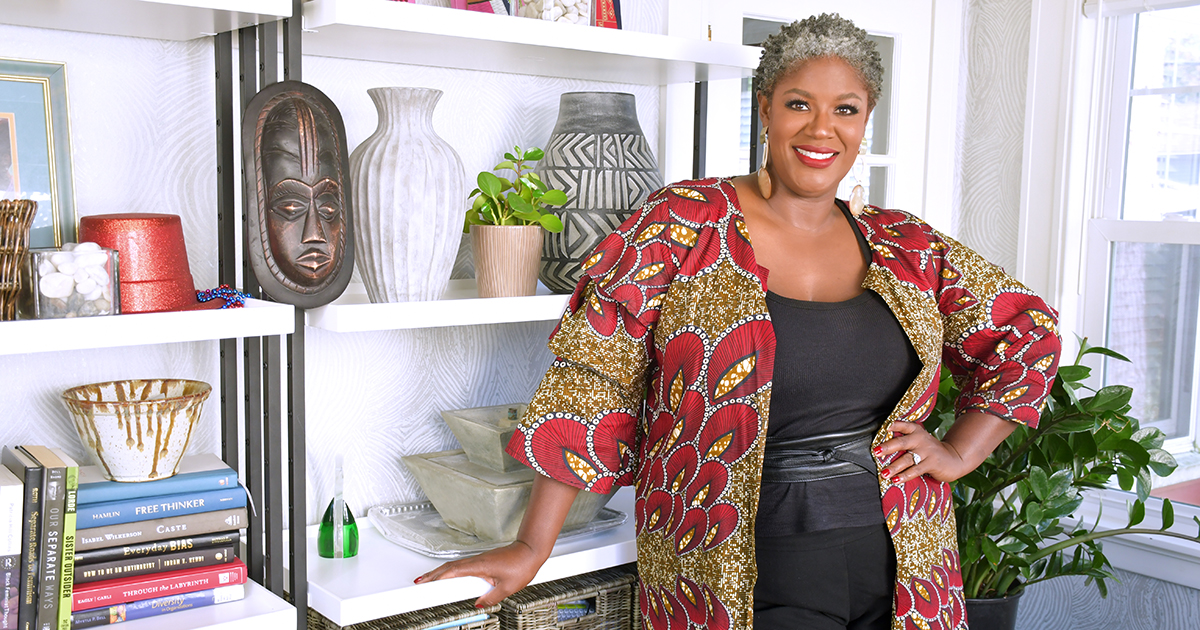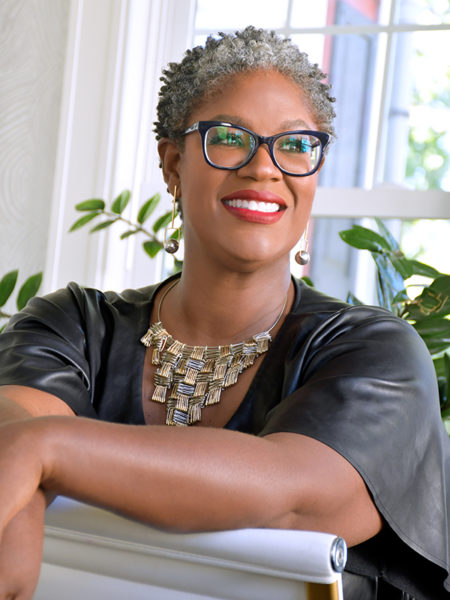Connection, Courage Necessary to Defeat Systemic Racism in the Workplace

All it takes is a moment for anyone, from a new hire to a pivotal executive in leadership, to support and grow diversity, equity, and inclusion in the workplace, according to Dr. Tina Opie, an associate professor of management at Babson College.
Even small actions such as voicing support for members of historically marginalized racial groups during a high-stakes meeting, or listening more than you speak if you are from a power-dominant racial group, can mean another step toward equity, Opie said.
“I think there are things that all of us can do and that everyone can work on to share sisterhood,” Opie said, referencing her book, Shared Sisterhood: How to Take Collective Action for Racial and Gender Equity at Work.
The book, named on Forbes’ list of 10 Best Business Books of 2022, comes as social movements such as #MeToo, Stop Asian Hate, and Black Lives Matter have highlighted ongoing systemic racism and discrimination throughout corporate America. Opie and co-author Dr. Beth Livingston, an associate professor of management at the University of Iowa’s business school, wrote the book to address and empower all individuals to eliminate long-standing systemic inequities. Opie developed the idea for Shared Sisterhood over a decade ago and refined the idea with Livingston, eventually writing the book virtually during the pandemic.
“It’s about looking around and saying, ‘How can I change the immediate environment in which I’m planted?’ Jump into the sun where you are,” Opie said, a nod toward one of her favorite quotes from revolutionary novelist Zora Neale Hurston.
Opie also wanted to address another concern: Despite Black and white women sharing a common identity of being women, they rarely work together to fix the inequities that women often face in the workplace. Research shows that the intersection of race and gender means that those inequities manifest in different ways for Black and white women. For example, while women experience a gender pay gap, Black women experience a much larger pay gap than their white women counterparts.
“I really feel that part of the reason why we can’t come together is because we’re talking past each other. We don’t understand each other,” Opie said. “There’s a lack of connection and a lack of trust, not only throughout history but in contemporary times as well. So, the idea was, how can we redress that? How can we address that?”
Dig and Bridge
The first step, Opie said, is to encourage employees to question their own views about race. The exercise—dig—is one of three action items detailed throughout Shared Sisterhood.
“Dig is about introspection; it’s about understanding your background. When did you learn you were white? How do you feel about being white? What does whiteness mean to you,” Opie said.
The discussion might not be easy, Opie said, but it’s an important step.
“In order for us to even get to a place where we can begin to have a common understanding, we need to really interrogate where all of our assumptions come from and understand how that impacts the workplace,” Opie said.
“In order for us to even get to a place where we can begin to have a common understanding, we need to really interrogate where all of our assumptions come from and understand how that impacts the workplace.”
Dr. Tina Opie, associate professor of management at Babson College and author of Shared Sisterhood
The next step—bridge—encourages historically marginalized employees and employees who have historically been power-dominant to develop an authentic connection despite their differences. Opie defines power as access to and control of resources such as money and influence over laws, policies, and the writing of history itself.
“That connection is based on trust, vulnerability, empathy, and risk taking. All four of those ingredients are necessary,” Opie said.
Risk taking, for example, could mean standing up for a historically marginalized co-worker during an important meeting.
“You can empathize with someone and make yourself vulnerable, but if you never take a risk for them in public, they’re going to lose trust in you,” Opie said. “Take a risk. Use your social capital to help; otherwise, you’re not really their Sister.”
Acting Together
The last step—Act—is about using that earned trust to provide a united front when addressing inequities throughout a corporation.
“Now that we’ve linked arms, we can look at these systems and work toward change together,” said Opie, adding that inequity can be found anywhere. “From recruiting, onboarding, socialization, evaluation, training, pay, promotion, all the way around to workforce planning and retirement. You can pick any of those systems.”

Through her consulting company, Opie Consulting Group LLC, Opie has already worked with 12 organizations to help leadership apply this new methodology. The work involves identifying systemic inequities and making informed, collaborative changes to address those issues—something that requires real risk on behalf of businesses.
“Some companies don’t want to do these investigations into pay or promotion disparities because they’re afraid of litigation,” Opie said.
One firm, however, worked with Opie and held a four-month series of immersive training workshops and small peer group sessions. Their work was overseen by an outside diversity, equity, and inclusion (DEI) expert, and the organization has already implemented several changes: a new e-learning platform for all employees to provide ongoing DEI training, and a pay-equity analysis that could be released this summer.
In addition to the Shared Sisterhood framework, the book uses history, research, and real-life examples to highlight the many benefits that come from authentic connections. The book itself is a prime example, Opie said.
“The relationship that Beth and I have is really a microcosm of Shared Sisterhood, because it wasn’t always smooth sailing, and we both had to undergo some digging. Together, we’ve engaged in collective action, and the fruit of that has been Shared Sisterhood,” Opie said. “The evolution of this book absolutely had to happen in sisterhood with someone I trust and like.”
Posted in Insights




